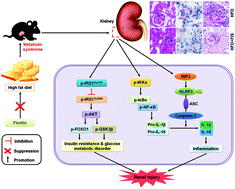Fisetin supplementation prevents high fat diet-induced diabetic nephropathy by repressing insulin resistance and RIP3-regulated inflammation
Abstract
Obesity-related renal disease is related to caloric excess promoting deleterious cellular responses. However, a full understanding of the molecular mechanisms involved in progressive kidney disease, as well as a therapeutic strategy, is still absent. Fisetin (FIS), as a natural flavonoid, possesses various bioactivities in a number of disease models. However, its role in obesity-associated kidney injury is still unclear and requires elucidation. In our study, an obesity animal model was established using C57BL/6 mice fed with a normal chow diet (NCD) or high fat diet (HFD) for 16 weeks with or without FIS administration (20, 40 or 80 mg kg−1). Our results indicated that chronic HFD feeding led to a significant body weight gain in mice compared to the normal control group, accompanied by a marked insulin resistance and glucose intolerance, whereas FIS treatment exerted prominently protective effects. In addition, FIS significantly attenuated HFD-induced histological alterations in renal tissue samples. Moreover, FIS treatment down-regulated expression of kidney injury molecule-1 (KIM-1), and up-regulated nephrin and podocin expression levels in the kidneys of HFD-fed mice, improving their renal dysfunction. After HFD feeding, mice treated with FIS exhibited a decrease in phosphorylated IRS1Ser307, and an increase in phosphorylated glycogen synthase kinase 1 (IRS1Tyr608), AKT, forkhead box protein O1 (FOXO1) and glycogen synthase kinase (GSK)-3β. Furthermore, FIS administration markedly restrained the inflammatory response in the kidneys of HFD-challenged mice, as evidenced by the reduced pro-inflammatory cytokines, tumor necrosis factor-α (TNF-α), interleukin 6 (IL-6), IL-1β and IL-18, which was attributed to the blockage of nuclear factor κB (NF-κB) signaling. Importantly, FIS-treated obese mice exerted a remarkable decrease in RIP3 expressions in the kidneys compared to obese mice in the absence of FIS, along with an evident reduction in the NOD-like receptor protein 3 (NLRP3), an apoptosis-associated speck-like protein containing a Caspase recruitment domain (ASC) and Caspase-1. The protective effects of FIS against HFD-induced renal injury were verified in vitro using palmitate (PAL)-treated HK2 cells, an immortalized proximal tubule epithelial cell line from the adult human kidney. In summary, our results supported the notion that FIS functions as a promising agent to improve insulin resistance and inflammatory response against metabolic stress-induced renal injury.



 Please wait while we load your content...
Please wait while we load your content...